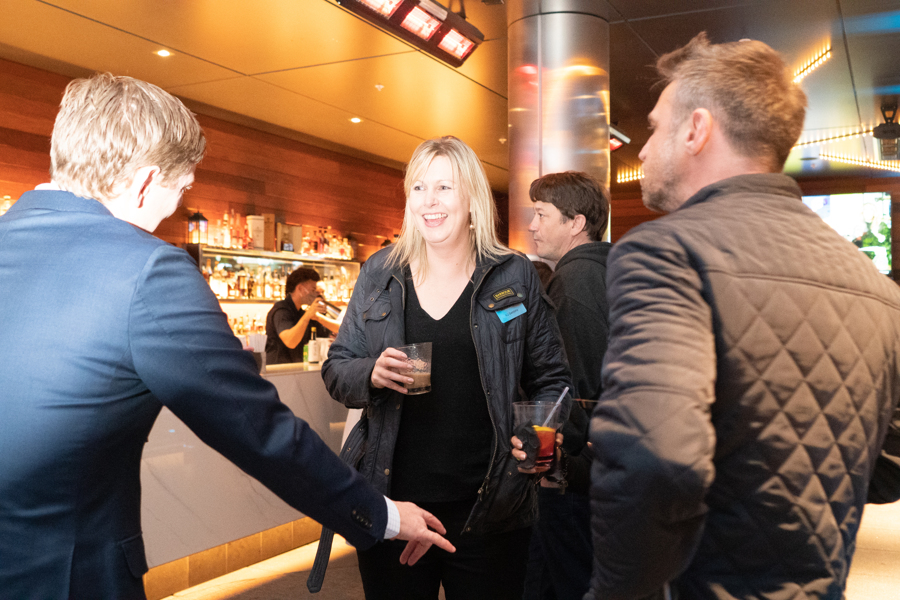On Tuesday March 8, Immersive Labs, along with countless other organizations, celebrated women. We joined the conversation to #BreakTheBias (the theme for 2022) and were lucky to have some of our incredible leaders join us for an internal panel discussion. Our host and General Counsel Alice Dunn was joined by our VP of Customer Success Stuti Bhargava, our Director of Data Science, Analytics, and Insights Emma Stowell, and Cate Cross, who wins the owner of the world’s longest job title as Senior Director of Growth Marketing and Creative Services.
And, wow, what a talk it was! Over 120 people across the business joined the panel as allies and champions of change.

Fun facts
In true Immersive tradition, we started the discussion with the panel sharing a fun fact about themselves. We discovered that Stuti is Immersive Labs’ own Dora the Explorer, having visited over 40 countries, Emma taught herself to juggle while being locked out of her caravan by her parents as a teenager, and Cate, an avid alpine skier, grew up in Vermont and started skiing at just 18 months old! Then came the panel questions.
What have you done to break the bias through your career?
The panel all agreed that it wasn’t until later in life that they became aware of bias. They had all worked in male-dominated environments, and so many things were normalized.
Stuti: I was often the only woman in the room. Although I was top of my class, I was always being offered help on tasks, and I started to realize that I was the only one! It took time to realize this shouldn’t be the norm. At first I tried to push back or explain why my view should be taken seriously. Eventually I learnt to let my work do the talking.
I’ve also often been told that I have to choose between being a mom and being a career woman. I am a better mom from the choices I’ve made about my life. Every woman has a choice on how they live their life, but it’s important to know you can be a mom AND a career woman.
Emma: Working in data I’ve always been in male dominated environments. I’ve worked in places with very open bias against females and I started seeing the problems it caused. Don’t abide by standards and norms that are there, and don’t conform to stereotypes. I use my more ‘feminine’ qualities, which should be seen as leadership qualities. They just don’t fit the ‘bias’ of what we’re told make good leadership qualities.
Cate: I like to run towards a problem. I have always taken roles in more male-dominated areas. I’ve worked in male-dominated journalist offices, then I learned to code and worked in a male-dominated environment again, and it’s always given me a focus to challenge the biases out there. No matter your gender or how you identify, you should have equal opportunities. I’ve found that the hardest working and best people out there are those that have been marginalized as they have had to teach themselves to be at the top of their game to just break in.

What women do you admire and why?
Emma: Jacinda Ardern – she has kept her feminine qualities in her style of leadership. It’s true strength to do that in a male-shaped world and her results speak for themselves.
Cate: Madeleine Kunin – she was the first female governor in Vermont and second in the whole of the US. She was famous for saying, “if you’re not at the table, you’re on the menu”. I’m also going to cheat a little and choose a second – Stacey Abrams ran for state senate in Georgia and started a not-for-profit called Fair Fight. She was told she could never do it, and she said “watch me”.
Stuti: Mindy Kaling – she’s a comedian of color (who you may know as Kelly Kapoor in the Office). I admire the things she’s had to overcome to be taken seriously, her sheer talent, hard work, and capability. She also continues to elevate other women. Like Cate, I’m also going to name a second woman I admire. My mom is sadly no longer with us, but she overcame many challenges and fought for the opportunities I’ve had. My successes would never have happened without her.
If you could go back in time and give your younger self one piece of advice, what would it be?
Cate: I would tell myself to talk about my family and my kids more. I’m a mom to two amazing boys. I’m on the selectboard for my region and I had to write a bio for it; I didn’t mention my kids, and someone said to me: ‘don’t you have two boys? You should really mention that.’ I’ve always omitted this as I thought people would see it as something that would hold me back. I didn’t realize I was unconsciously conforming to gender assumptions. I now talk openly about my boys. They make me who I am.
I also would tell myself to discuss the fact I have ADHD. Immersive Labs helped make me comfortable sharing this. I have ADHD. I have the ability to hyperfocus. It is my superpower.
Stuti: Confidence isn’t walking into the room and thinking you’re the most intelligent, it’s walking into a room and not comparing yourself to anyone. You don’t have to be perfect, you just have to be real. I often tell my team that I hired them because they’re more intelligent than me.
Emma: Ask for what you want. Don’t expect people to see what you’re doing and think they’ll promote you. Ask for it. Don’t rely on anyone but yourself.
In addition, when I reflect on things over my career and the things I’ve stayed silent about, if people are saying things that you feel uncomfortable about, you should challenge it in a respectful way. Staying quiet means the world won’t change. We have to speak up.

Audience questions
How are we ensuring more diversity in senior roles and less diverse teams?
We had a couple of our People and Talent team help to answer this one, to explain that we constantly measure where we are with diversity data. We can still do better. We’ve joined underrepresented groups externally, we use positive action sourcing to proactively source diverse candidates, and we challenge ourselves to think beyond the usual technology bias of what ‘good’ looks like.
Some of our successes so far include that last year, 45% of our new hires identified as women in our engineering teams. This year we measured who we promoted. It was 50.9% women, 47.2% men, and 1.9% non-binary employees. While we call this measure of equality success, we know that this should be the norm.
We’ll also start doing more salary analysis to ensure there’s no bias. We do a lot to make sure women are paid fairly at Immersive Labs: in recruitment we ignore salary expectations and look at the role and the skills of the candidate to make a decision on how much a successful candidate will get paid. It’s good to start measuring this to ensure all our practices help to eliminate bias.
What do our panel think about emotion in the workplace?
Emma: In society we’re more equipped to deal with anger in the workplace than crying in the workplace. There’s nothing wrong with showing emotion at work. We shouldn’t be ashamed of crying at work. It shows you care. We need to normalize it in the same way that anger is normalized to show that you care or are frustrated.
Cate: I’m a crier, and it’s been difficult for me in my career. I cry when I am frustrated and when I am upset. We shouldn’t fear tears at work, it’s an opportunity to engage.
Stuti: Emotion and passion are the same thing. With passion comes emotion – you can’t have one without the other. We have to normalize it and educate people on how to react to crying as well as how we respond to anger.
Do you have any examples of awesome allies?
Stuti: I’ve been very fortunate to have some amazing male leaders and mentors. I was once in a meeting, and I got passionate about something. Someone said ‘you don’t have to be so aggressive,’ and it completely shut me off. The meeting continued, then a male colleague made an argument and got animated. The same person gave the feedback, ‘you were very confident in your point.’ A male colleague in the room challenged that person in the moment, saying ‘it’s interesting that you said aggressive to Stuti and confident to X.’ It was done articulately and in a way that nobody felt uncomfortable.
Emma: I worked with a male leader who actively promoted females in the business. When you looked at the other male leaders’ leadership teams, they were all men, whereas his had a high proportion of female leaders.
Cate: We need to discuss openly going through and coming back from parental leave. Talk about it more. Tell your mom-to-be employees that: their job is safe when they come back. Again – normalize it, challenge the bias that you had
to choose parenthood or a career. You can do both.

A final word from our host, Alice
Individually, we’re all responsible for our thoughts and actions. We’ve learnt today that bias, whether deliberate or unconscious, really does make it difficult for women moving ahead. One of Immersive Labs’ core values is inclusivity, and so, we are each responsible for celebrating its presence and for calling out its absence. I think we can all agree that an equal world is an enabled and better world.

Corina Hawkins,
Talent Acquisition Partner


